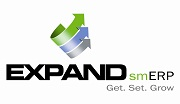 Cloud
ERP, like the name suggests is very much based in the cloud. It is
the practice of using a network of remote servers hosted on the
internet in order to access hardware, software and other services on
demand, any
time
and anywhere. It makes use of various cloud computing platforms and
services to provide more flexible business process transformation to
business. In Cloud ERP, information shared across departments relies
on the cloud rather than the infrastructural facility of the
proprietor. It is seen as tool which helps small and medium
businesses unlock their potential and enhance their performance and
productivity. The SMEs can offload resource-intensive functions like
storage, web-hosting and e-mail. By employing the correct choice and
proper usage of Cloud ERP solution, companies can reduce their costs
and increase their profits. In the past decade other software
applications have seen a shift to cloud computing as one of the
fastest growing segments in the IT industry. As we enter the modern
era, we see that cloud computing is a modern trend that reveals next
generation application architecture.
Cloud
ERP, like the name suggests is very much based in the cloud. It is
the practice of using a network of remote servers hosted on the
internet in order to access hardware, software and other services on
demand, any
time
and anywhere. It makes use of various cloud computing platforms and
services to provide more flexible business process transformation to
business. In Cloud ERP, information shared across departments relies
on the cloud rather than the infrastructural facility of the
proprietor. It is seen as tool which helps small and medium
businesses unlock their potential and enhance their performance and
productivity. The SMEs can offload resource-intensive functions like
storage, web-hosting and e-mail. By employing the correct choice and
proper usage of Cloud ERP solution, companies can reduce their costs
and increase their profits. In the past decade other software
applications have seen a shift to cloud computing as one of the
fastest growing segments in the IT industry. As we enter the modern
era, we see that cloud computing is a modern trend that reveals next
generation application architecture.
There
are 3 main delivery models in which cloud computing can be subdivided
in- Software as a Service (SaaS), Platform as a Service (PaaS) and
Infrastructure as a Service (IaaS).
-
Software as a Service targets the end user or business. It is concerned with the delivery of an application to multiple customers through an underlying database and object code. This is the category to which cloud ERP solutions belong.
-
Platform as a Service is the delivery of middle-ware targeted towards developers with a platform that incorporates the entire development cycle.
-
Infrastructure as a Service is the delivery of computing power targeted towards administrators. This service promotes a usage based pricing structure, where a customer only pays for the amount of capacity that is used.
This
new ERP delivery model is slowly gaining success and is constantly
increasing its market share. In a survey conducted by Oracle in 2012,
70 percent of the CFOs stated that they would consider using a
cloud-based version of their ERP. The ERP Report from Panorama
Consulting in 2012 quantifies the momentum of cloud ERP revealing its
market share growth from 6 percent to 18 percent in the period
2011-12. This phenomenal growth is making many traditional ERP
companies to become cloud based in order to avoid losing market
share. Price Waterhouse Cooper predicted in 2015 that investments in
SaaS will more than double to $78 billion while investments in
traditional ERP will decline by more than 30 percent in 2016. Slowly
but steadily the Cloud based format is spreading its wings and
enveloping all.
